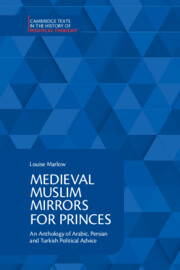Book contents
- Medieval Muslim Mirrors for Princes
- Cambridge Texts in the History of Political Thought
- Medieval Muslim Mirrors for Princes
- Copyright page
- Dedication
- Contents
- Figures and Maps
- Preface and Acknowledgements
- Conventions
- Abbreviations
- Part I Introduction
- Part II Texts
- 5 The Nature of Sovereignty
- 6 The King’s Person and Character
- 7 Foundations of Royal Authority and Principles of Governance
- 8 The Practice of Good Governance
- 9 Problems in the Kingdom and Their Remedies
- Appendix Index of Qurʾanic References and Quotations
- Glossary
- Bibliography
- Index
- Cambridge Texts in the History of Political Thought
5 - The Nature of Sovereignty
from Part II - Texts
Published online by Cambridge University Press: 15 January 2023
- Medieval Muslim Mirrors for Princes
- Cambridge Texts in the History of Political Thought
- Medieval Muslim Mirrors for Princes
- Copyright page
- Dedication
- Contents
- Figures and Maps
- Preface and Acknowledgements
- Conventions
- Abbreviations
- Part I Introduction
- Part II Texts
- 5 The Nature of Sovereignty
- 6 The King’s Person and Character
- 7 Foundations of Royal Authority and Principles of Governance
- 8 The Practice of Good Governance
- 9 Problems in the Kingdom and Their Remedies
- Appendix Index of Qurʾanic References and Quotations
- Glossary
- Bibliography
- Index
- Cambridge Texts in the History of Political Thought
Summary
A prominent theme in the mirror literature is the exceptionalism of the king’s position, a point often presented as the result of divine selection or favour. Many mirror-writers evoke, in various articulations, the notion of the divine mandate – the proposition that the king ruled by virtue of divine choice and with divine support. But the authors bring very different perspectives to this idea; even when they invoke a common repertoire of formulae and metaphors, they employ them to create different meanings. Several authors insist that the singular bounties that the king enjoys are counterbalanced by unparalleled, and burdensome, responsibilities. The texts in this chapter are drawn from Pseudo-Māwardī, Naṣīḥat al-mulūk; al-Thaʿālibī, Ādāb al-mulūk; al-Māwardī, Tashīl al-naẓar wa-taʿjīl al-ẓafar; Ghazālī, Naṣīḥat al-mulūk; and al-Ṭurṭūshī, Sirāj al-mulūk.
- Type
- Chapter
- Information
- Medieval Muslim Mirrors for PrincesAn Anthology of Arabic, Persian and Turkish Political Advice, pp. 85 - 142Publisher: Cambridge University PressPrint publication year: 2023

